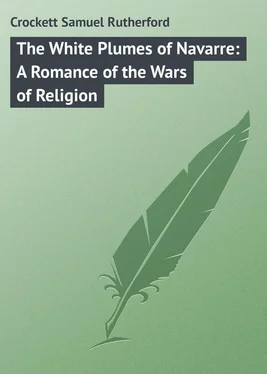Samuel Crockett - The White Plumes of Navarre - A Romance of the Wars of Religion
Здесь есть возможность читать онлайн «Samuel Crockett - The White Plumes of Navarre - A Romance of the Wars of Religion» — ознакомительный отрывок электронной книги совершенно бесплатно, а после прочтения отрывка купить полную версию. В некоторых случаях можно слушать аудио, скачать через торрент в формате fb2 и присутствует краткое содержание. ISBN: , Жанр: foreign_prose, на английском языке. Описание произведения, (предисловие) а так же отзывы посетителей доступны на портале библиотеки ЛибКат.
- Название:The White Plumes of Navarre: A Romance of the Wars of Religion
- Автор:
- Жанр:
- Год:неизвестен
- ISBN:http://www.gutenberg.org/ebooks/33215
- Рейтинг книги:3 / 5. Голосов: 1
-
Избранное:Добавить в избранное
- Отзывы:
-
Ваша оценка:
- 60
- 1
- 2
- 3
- 4
- 5
The White Plumes of Navarre: A Romance of the Wars of Religion: краткое содержание, описание и аннотация
Предлагаем к чтению аннотацию, описание, краткое содержание или предисловие (зависит от того, что написал сам автор книги «The White Plumes of Navarre: A Romance of the Wars of Religion»). Если вы не нашли необходимую информацию о книге — напишите в комментариях, мы постараемся отыскать её.
The White Plumes of Navarre: A Romance of the Wars of Religion — читать онлайн ознакомительный отрывок
Ниже представлен текст книги, разбитый по страницам. Система сохранения места последней прочитанной страницы, позволяет с удобством читать онлайн бесплатно книгу «The White Plumes of Navarre: A Romance of the Wars of Religion», без необходимости каждый раз заново искать на чём Вы остановились. Поставьте закладку, и сможете в любой момент перейти на страницу, на которой закончили чтение.
Интервал:
Закладка:
It was the usual beginning of their quarrels, of which they had had many as they posted along the Bordeaux road Pariswards. The Marquis Osorio was travelling on a secret mission to Paris, a mission which had nothing to do with the crowned and anointed King of France, now in uncertain refuge at Blois.
King Philip had sent for him, and the Demon of the South had been in good humour when he gave the stout Leonese gentleman his instructions. He had just heard of the Day of the Barricades, and the success of the Duke of Guise.
The Marquis had stood up before the master of two worlds, bronzed, hale and bearded: not too clever, but just shrewd enough to please the King, and certainly indomitable in doing what he was told. He had very much the air of a free man and good subject, with his flat travelling cap in one hand and the fingers of the other gripped staunchly about his sword-hilt.
"The iron is hot on the anvil," said the King, "strike, Osorio! It is a good job that the Duke of Err is out of the way. The pressure of the times was too much for him. His poor old brain rocked. His Duchess has taken him off somewhere to feed with spoon-meat. Olivarez, whom I have sent to follow him, will give you no trouble. He will occupy himself with King Henri and the Medici woman. The League and Guise – these are your game – especially Guise. I suspect him to be a wind-bag, but put him under your arm, and the wind in him will bravely play our music, like a pair of Savoyard bagpipes. And hark ye, Osorio, listen to the Jesuit fathers, especially Mariana – a very subtle man, Mariana, after mine own heart. And also (here he sank his voice to something mysterious), above all take with you your – your niece – Valentine?"
"Valentine la Niña!" ejaculated the King's representative, with a quick, startled look at his master.
"Even so," said Philip, casting his eyes through the slit behind the high altar of the Escorial to see what the priests were doing; "even so; our Holy Mother Church is in danger, and if any love father or mother, son or daughter more than her, he is not worthy of her!"
So by royal command Valentine la Niña rode northward with her uncle, and though these two loved one another, they wrangled much by the way.
Claire and her cavalcade were reaching Blois, when the uncle and niece entered Angers by the Long Bridges of Cé.
The cause of the girl's outbreak of petulance had been a harangue of the envoy, in which he had explained, amongst other things, the reasons for keeping their mission a secret. The King of France must not hear of it, because their Philip did not want to show his hand. Henry of Navarre must not hear of it, or he might send men to harry the Cerdagne and Aran. Besides, what was the use of making a show in Paris, when the very shop-tenders and scullions there played King Philip's game? Was not the Sorbonne packed with wise doctors all arguing for Spain? Wild monks and fanatic priests proclaimed her as the only possible saviour of the Faith. At the back of Guise stood King Philip. Remained therefore (according to the envoy) to push Guise forward, to use him, to empty him, and then – let the Valois and the Medici have their will of him. There was no reason for Spain to appear in the matter at all. Guise must be induced to go to Blois, and – his enemies would do the rest.
It was then that Valentine la Niña burst forth in indignation.
She would not be the lure, she said, even for a king – a bait dangled before an honest man's eyes – no, not even for her uncle!
"I am an Osorio," the envoy answered her sternly, "the head of the family, you can surely trust me that nothing shall be asked of you which might cast a stain on the name – "
"Not more than was asked of my mother!" she retorted scornfully, "only to sacrifice herself and her children – a little thing for so good a king – his people's father!"
"And for the Faith!" said the Marquis, hastily, as if to escape discussion. "Listen, Valentine! The famous Father of the Gesù, Mariana, will be in Paris before us. He has been reporting to the King, and he it is who has asked for your presence. None can serve the Church so well as you."
"I know – I know," cried the girl, "fear not, I have been well drilled. My mother taught me that the whims of men were to be called either high policy or holy necessity. It little matters which; women have to be sacrificed in either case. Let us ride on to Paris, Uncle Osorio, and say no more about it!"
They lighted down in the empty courtyard of the Spanish ambassador's house, which was next to the hotel of the Duke of Guise. A shouting crowd had pursued them to their lodging. For the Spaniards were popular in the city, and the arrival of so fine a cavalcade had rightly enough been interpreted to mean the adherence of Philip of Spain to the new order of things.
"Had Spain been for the King, this envoy would have hied him to Blois," said De Launay, the old provost of the merchants. "But since Philip sends his ambassador direct to the good city of Paris, why, then, it follows that he is of the mind to put down Valois, to set aside Navarre, and to help us to crown our only true king, the King of Paris and of France, the King of the Faith, and of his people's hearts – Guise, the good Guise!"
Because, even thus early, the habit of municipal eloquence had been formed and its pattern set for all the ages. De Launay was considered a good practitioner.
The windows of Valentine Osorio's chambers looked on the garden of the Hotel of Guise – a shady orchard close where in the evening the Duke often walked with his gentlemen, and specially with his handsome young brother, the Duke of Bar.
On an evening of mackerel cloud, pearl-grey and flaky gold vaulting so high overhead that the sky above the small smokeless Paris of 1588 seemed infinite, Valentine sat gossiping with her maid Salome.
To them, with the slightest preface of knocking, light as a bird, entered a priestly figure in the sombre robes of the Society of Jesus – a little rosy-cheeked man, plump and dimpled with good living, and, as it seemed, good nature.
But at the sight of him a nervous shudder passed through the body of the young girl. So in a school, when the master returns before his time, playing scholars draw unwillingly with downcast, discontented eyes to sterner tasks. Yet the Jesuit was kindly and tolerant in manner, prodigal of smile and compliment. There was nothing of the Inquisitor about the famous father Mariana, historian and secret politician.
"Fairer than ever, Mistress Valentine," he murmured, after he had exchanged a glance with the maid Salome, "ah, the blessed thing which is beauty when used for sanctified ends! Seldom is it thus used in this world of foolish women! But you are wise. The Gesù are under deep obligations, and the King – the King – ah, he will not forget. He has sent you hither, and has commissioned me to speak with you. Your good, your excellent uncle, Osorio, knows some part of King Philip's plans, but not all – no, not all. He is too blunt an instrument for such fine work. But you can understand, and shall!"
The girl struck her hands together angrily and turned upon him.
"Again – again!" she said, "is it to be treachery again?"
"Not treachery, dear lady," cooed the father; "but when you go to tickle trout, you do not stand on the bank and throw in great stones. You work softly underneath, and so guide the fish to a place from which they cannot escape."
"Is it Guise?" demanded the girl, breaking fiercely through these dulcet explanations.
"As you say," smiled the Jesuit; "himself and no other."
"And what is to be my particular infamy?"
"Child, beware of your speech," said the Jesuit; "there is no infamy in the service of Holy Church, of the Society, and of your King."
Читать дальшеИнтервал:
Закладка:
Похожие книги на «The White Plumes of Navarre: A Romance of the Wars of Religion»
Представляем Вашему вниманию похожие книги на «The White Plumes of Navarre: A Romance of the Wars of Religion» списком для выбора. Мы отобрали схожую по названию и смыслу литературу в надежде предоставить читателям больше вариантов отыскать новые, интересные, ещё непрочитанные произведения.
Обсуждение, отзывы о книге «The White Plumes of Navarre: A Romance of the Wars of Religion» и просто собственные мнения читателей. Оставьте ваши комментарии, напишите, что Вы думаете о произведении, его смысле или главных героях. Укажите что конкретно понравилось, а что нет, и почему Вы так считаете.












